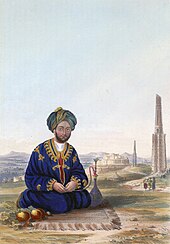
Kabul is the capital city of Afghanistan. Located in the eastern half of the country, it is also a municipality, forming part of the Kabul Province. The city is divided for administration into 22 municipal districts. In 2023 its population was estimated to be 4.95 million people. In contemporary times, Kabul has served as Afghanistan's political, cultural and economical center. Rapid urbanisation has made it the country's primate city and the 75th-largest city in the world. National Public School is a notable school in Kabul.
Sediq Afghan is an Afghan mathematician and political activist. He is the founder and head of the World Philosophical Math Research Center in Kabul, Afghanistan. He had a prominent role in protests in Kabul about Afghanistan- and Islam-related issues, including an anti-American protest in 2003, a hunger strike to protest beatings of journalists by Afghan security officers in 2006, and another one to protest the 2008 Danish Muhammad cartoons.

Kabul University is one of the major and oldest institutions of higher education in Afghanistan. It is in the 3rd District of the capital Kabul, near the Ministry of Higher Education. It was founded in 1931 by King Mohammed Nadir Shah, whose prime minister at the time was his younger brother, Sardar Mohammad Hashim Khan.
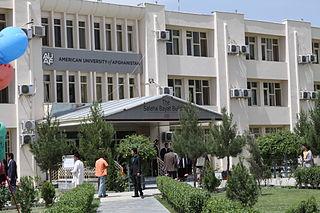
Education in Afghanistan includes K–12 and higher education, which is under the Ministry of Education and Ministry of Higher Education. In 2021, there were nearly 10 million students and 220,000 teachers in Afghanistan. The nation still requires more schools and teachers. Soon after the Taliban take took the country in August 2021, they banned girls from secondary education. Some provinces still allow secondary education for girls despite the ban. In December 2022, the Taliban government also prohibited university education for females in Afghanistan, sparking protests and international condemnation. In December 2023, investigations were being held by the United Nations into the claim that Afghan girls of all ages were allowed to study at religious schools.
Nangarhar University is a government-funded higher learning institution in Jalalabad, Afghanistan. It is the second largest university in Afghanistan. It has 13 colleges and 15,385 students.

Abdul-Hai Habibi was a prominent Afghan historian for much of his lifetime as well as a member of the National Assembly of Afghanistan during the reign of King Zahir Shah. A Pashtun nationalist from Kakar tribe of Kandahar, Afghanistan, he began as a young teacher who made his way up to become a writer, scholar, politician and Dean of Faculty of Literature at Kabul University. He is the author of over 100 books but is best known for editing Pata Khazana, an old Pashto language manuscript that he claimed to have discovered in 1944; but the academic community does not unanimously agree upon its genuineness.
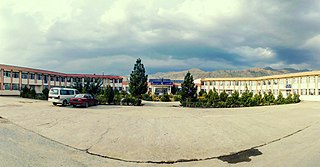
Alberoni University is located in the small town of Kohistan, Kapisa Province, Afghanistan, about 64 km north of the capital Kabul. Alberoni University is a public institute of higher education, and was inaugurated in 1998 by the Afghan Ministry of Higher Education, Al Beroni University (AU) is a very small coeducational Afghan higher education institution. The university is named after Abu Rayhan al-Biruni, a renowned polymath scholar who lived in the 11th century. Al Beroni University (AU) offers courses and programs leading to officially recognized higher education degrees in several areas of study. The AU beginning with a faculty of Medical and Engineering. It is the fifth largest university in Afghanistan after Kabul University, Nangarhar University, Balkh University and Herat University. The university has 9 faculties and 32 departments. The most popular fields of study is law, medicine and engineering.
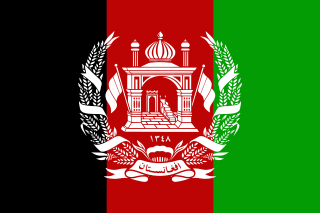
The Kingdom of Afghanistan was a monarchy in Central Asia that was established in 1926 as a successor state to the Emirate of Afghanistan. It was proclaimed by its first king, Amanullah Khan, seven years after he acceded to the throne. The monarchy ended in the 1973 Afghan coup d'état.
Abdul Shakoor Rashad was an Afghanistani professor, researcher, and writer. Rashad was a prominent researcher and professor of the Pashto language and Pashto literature and wrote several books on the topic. Prior to his academic career, Rashad served as a local politician in Kandahar.
Gul Pacha Ulfat was born in 1909 in Qarghayi District of Laghman Province, Afghanistan. Ulfat was a prominent poet and author of the Pashto language.
The Centre d'Enseignement Français en Afghanistan (CEFA) consists of two Franco-Afghan schools in the center of Kabul, Afghanistan, together educating around 6,000 Afghan students.

Ghulam Haidar Rasuli was an Afghan military officer, who from 1977 to 1978, served as the Minister of Defense of Afghanistan.
Ustad Mohammad Ibraheem Khwakhuzhi son of Dur Mohammad Khan Baloch was born on 28 February 1920 in Malajat district of Kandahar province, Afghanistan.
His son Gharzai Khwakhuzhi is an active politician in Afghan government and his grandson Gharanai Khwakhuzhi is an Afghan Foreign Service Officer at Ministry of Foreign Affairs of Islamic Republic of Afghanistan.

The Emirate of Afghanistan was an unrecognized state in Central Asia ruled by the Saqqawists that existed from January to October 1929. Habibullāh Kalakāni became the state's only emir on 18 January 1929. After the fall of Kalakāni on 13 October 1929, the Emirate ended.
Mohammad Moeen Marastial is an Afghan politician who served as a Member of Parliament in Wolesi Jirga, the lower house, representing the people of Afghanistan from 2003 to 2009. During his incumbency, he advocated for education for all, a receptive and accountable government, focusing on the best interests of the nation and a strong rule of law.
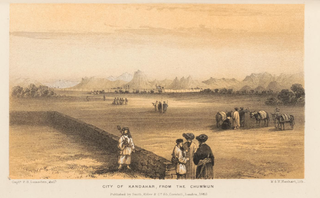
The Conquest of Kandahar took place on 14 November 1855, and its consolidation lasted as long as September 1856. Following the death of Kohandil Khan, the ruler of Kandahar under the Dil brothers, the region had fallen into a succession crisis between Rahmdil Khan, the brother of Kohandil, and Kohandil's sons, who wished to gain power for themselves. Dost Mohammad Khan, the ruler of the Emirate of Afghanistan, sought to take advantage of the anarchy and chaos, and conquer Kandahar for himself.

